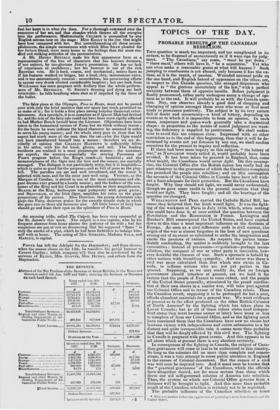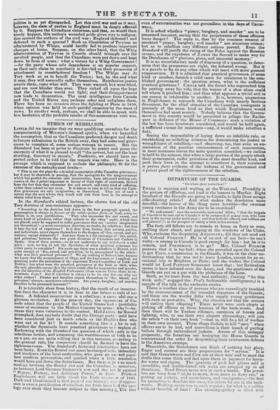TOPICS OF THE DAY.
PROBABLE RESULTSF THE CANADIAN REBErLION.
Tats question is much too important, and too complicated in its nature, to be disposed of sententiously as if it were ripe for judg- ment. " The Canadians," say some, " must be put down :" " there must," others will have it, " be a separation." Yet who can even make a reasonable guess at what will happen ? Such jumping to conclusions is not absurd, only because it has the ex- cuse, as it is the result, of passion. Wounded national pride on the one hand, and English hatred of oppression on the other, are, in respect to this Canada question, like enraged disputants who appeal to " the glorious uncertainty of the law," with a perfect certainty between them of opposite results. Before judgment is finally pronounced, either party undergoes many a change of opt. nion as to the end. It will probably be so with the Canada ques- tion. Nay, one observes already a good deal of chopping and changing of opinion amongst those even who were at first most ready to pronounce positively. The subject is by its very nature full of doubt and uncertainty—a kind of lottery, depending on events as to which it is impossible to form an opinion. In such cases, conjecture and guess-work generally take a dogmatical shape : in proportion as the means of sound judgment are want- ing, the deficiency is supplied by positiveness. We shall endea- vour to avoid this too common error. Impressed with no other conviction as to the end of this beginning, than that it will be de- termined by events not yet foreseen by any one, we shall confine ourselves for the present to inquiry and reflection. If there bad been more inquiry on this subject, " the lottery of war," as NAPOLEON wisely called it, would probably have been avoided. It has been taken for granted in England, that, come what might, the Canadians would never fight. On this assump- tion, the Colonial Office (for the British nation has really had no part whatever in the grievances of which the Canadians complain) has provoked the people into rebellion; and on this assumption the servants of the Colonial Office in Canada have been left with- out a force adequate for their protection. But the Canadians have fought. Why they should not fight, we could never understand; though we gave some credit to the general assertion that they would not fight. They have fought; and all the bearings of the question are changed. WELLINGTON and PEEL carried the Catholic Relief Bill, be- cause they believed that the Irish would fight. It was the fight- ing of the workmen at Paris in July 1830, which, when nothing else could have done it, at mice settled the question between the Revolution and the Restoration in France. Lexington and Bunker's Hill emancipated the United States, and have exerted down to this time a most important influence on the destinies of Europe. As soon as a civil difference ends in civil contest, the origin of the war is almost forgotten in the host of new questions arising out of an event so calculated to strike the imagination and excite the passions of nations. As respects the parties imme- diately contending, the matter is suddenly brought to the last extremities : instead of persuasion—negotiation—perhaps recon- ciliation, the conquest of one or other party is inevitable, how- ever doubtful the chances of war. Such a spectacle is beheld by other nations with trembling sympathy. And never was there a civil war more calculated than that which now exists in Ca- nada, to inflame nations who are not yet parties in the quarrel. Supposing, as we may readily do, that no foreign government should interfere at present, yet we hold it for certain that the people of France to some extent, and the people of the United States generally, stimulated by the proud recollec- tion of their own shares in a similar war, will take part against our Colonial Office and in favour of the Canadian rebels. Thus the Canadian revolt, supposing it to be prolonged for but a year, affords abundant materials for a general war. We want evidence at present as to the effect produced on the other British Colonies of North America* by the fighting which has taken place in Lower Canada; but as all of these infant states (and indepen- dent states they must become sooner or later) have more or less to complain of from our Colonial Office, and as the fighting must have convinced them that the Canadians have now no choice but between victory with independence and entire submission to a far distant and quite irresponsible rule, it seems more than probable that they will be deeply affected by this civil war. The fighting in Canada is pregnant with great events. And this appears to be all about which at present there is any absolute certainty. In consequence of the fighting in Canada, the subject of Cana- dian grievances will come at last to be understood in this country. So long as the colonists did no more than complain and remon- strate, it was a vain attempt to rouse public attention in England to the causes of Colonial discontent. But the causes of a civil war will soon be inquired into. And it must soon be known that the " practical grievances" of the Canadians, which the officials have altogether denied, are far more serious than those which drove our old self-governed colonies of America into rebellion. Thus, the system on which our Colonial Office governs from a distance will be brought to light. And this more than probable result of the Canadian rebellion is certainly not to be regretted.
The probable influence of the Canadian rebellion on home
• This ass %Allen before the appearance of yesterday's news from Canada and the United States.
politics is as yet disregarded. Let this civil war end as it may, however, the state of parties in England must be deeply affected by it. Suppose the Canadians victorious, and that, as would then surely happen, this nation's wounded pride gives way to indigna- tion against the authors of the civil war : England defeated ! and defeated in such a quarrel ! Such an illustration of Toryism as administered by Whigs, could hardly fail to produce important changes at home. Suppose, on the other hand, that the Whig administration of Toryism in Canada should triumph over the revolted people, and that the Canadians were put down and kept down by force of arms : what a victory for a Whig Government ! —for the party whose sole dependence is on popular support, as their only claim to popularity is founded on their possession of attachment to constitutional freedom ! The Whigs may do Tory work so as to benefit the Tories; but, be the end what it may, they will assuredly suffer themselves. Retributive justice awaits them, come what will. They were warned, but were blind, and are now blinder than ever. They risked all upon the hope that the Canadians would not fight; and their disappointment now leads to desperation. The next intelligence from Canada and the United States may perhaps sober and enlighten them. There has been no occasion since the fighting at Paris in 1830, when opinion was held in such painful suspense by the want of news. In another week, perhaps, we shall be able to speak with less hesitation of the probable-results of this momentous civil war,
































 Previous page
Previous page